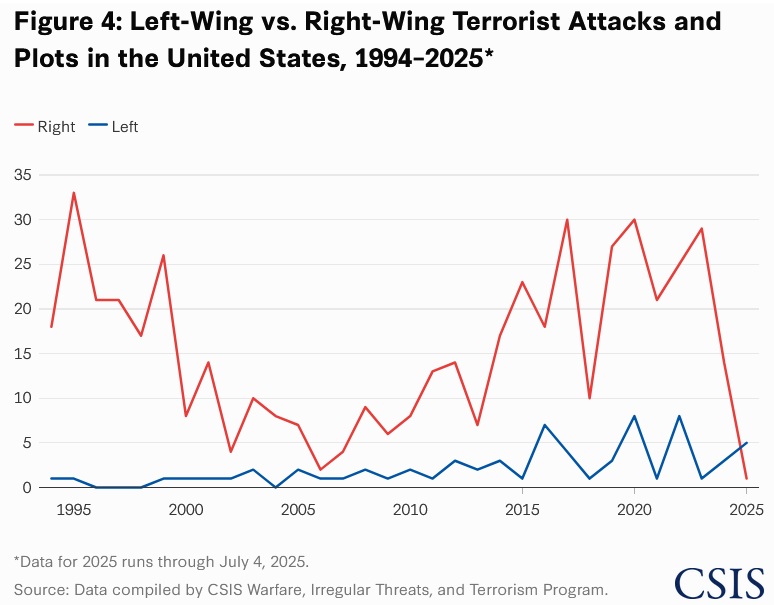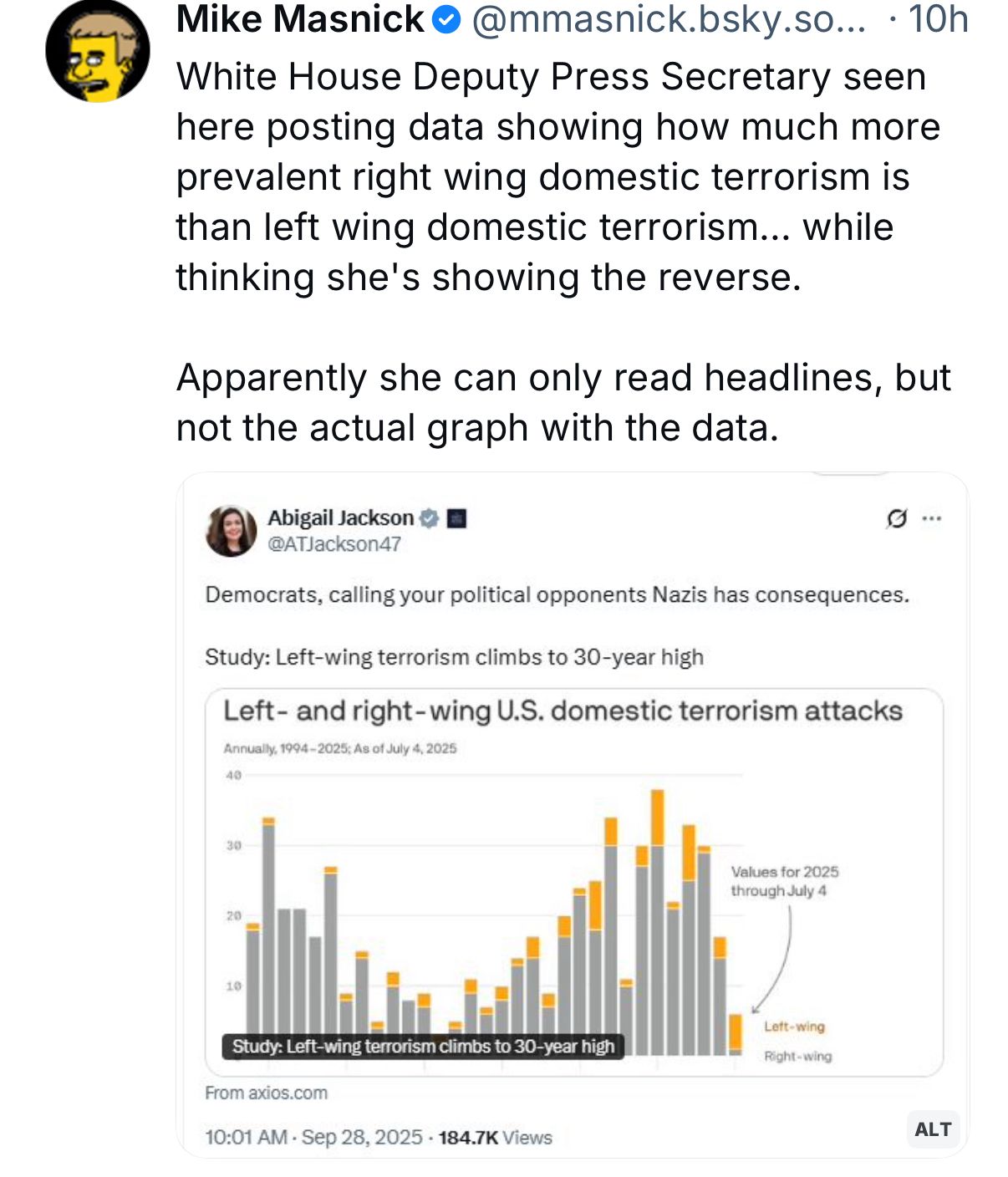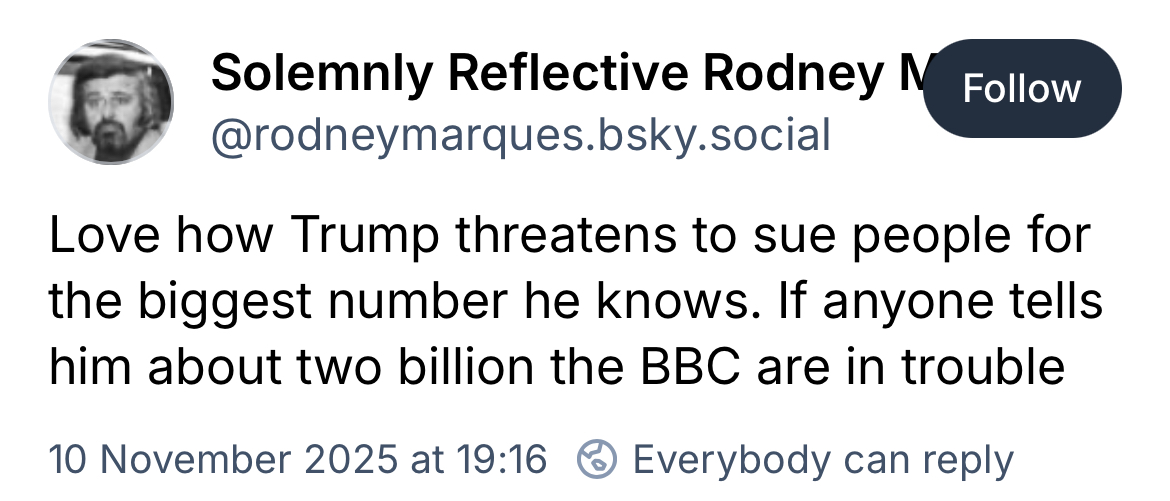Page 28 of 35
Re: Trump 2.0
Posted: Thu Oct 02, 2025 3:45 pm
by IvanV
The shutdown. To whose greater advantage?
Usually these shutdowns don't last very long, because the reputational cost to the opposition in refusing to pass a budget, and so causing a shutdown, is large. And typically the opposition gets only a few sweeties out of eventually agreeing, and the administration gets most of what it wants. The longest shutdown, at least in recent times, was 35 days.
Before the shutdown, I thought, maybe this plays into Trump's hands. He'll be able to stop spending on things he wants to stop spending on, but laws he can't escape from prevent him from cutting. And then I saw him saying publicly just that. Indeed, threatening that maybe spending won't be restored in those places. And that may be a reference to a recent SCOTUS ruling, see below.
Publicly, the Democrats are pointing to protecting the budget for Affordable Care Act ("Obamacare"), which this budget cuts. But there was an option tabled to keep things going for 7 weeks to discuss that specific issue further. So if that was all it was about, they could have kept things going for 7 weeks as they talked more. So some people don't believe that was the real reason. Some have suggested that that Schumer got it badly in the neck for avoiding a shutdown 6 months ago, and the main reason for that seems to be that many Democrats think that Trump is so awful there should be no collaboration
So is Trump more or less of a dicator in a shutdown?
Then some people are saying the
recent SCOTUS ruling (Vox via Yahoo) allowing the president to "impound funds", ie stop spending ordered by Congress, might make it very hard to get out of this shutdown. Because it implies that whatever the parties agree in Congress in relation to spending can often be subverted by the president, meaning that any agreement isn't worth the paper it is written on. And so how can there be an agreement in that case?
So, in the end, who does this damage more? And is this shutdown going to last a long time?
Re: Trump 2.0
Posted: Thu Oct 02, 2025 5:51 pm
by monkey
IvanV wrote: Thu Oct 02, 2025 3:45 pm
And is this shutdown going to last a long time?
The 2018/19 one went on for just over a month. People I have heard talking on the radio and such seem to have the consensus that it ended when air traffic controllers being annoyed at not being paid stopped showing up for work*, causing flight delays and much grumpiness towards everyone. I am expecting similar this time.
There's plenty of other people not getting paid too - the army not showing up for work would be quite funny.
*They do get paid for their time after the shutdown ends, but not everyone will be able to wait a month (or maybe two) for their pay before Problems begin.
Re: Trump 2.0
Posted: Fri Oct 03, 2025 8:40 am
by IvanV
...the Statue of Liberty and Ellis Island remained open, "thanks to the leadership of President Donald J Trump", a Department of the Interior spokesperson told the BBC.
Source (BBC)
Just the kind of thing they say in dictatorships with a leadership cult, Russia, China, N Korea, Turkmenistan, etc.
Last week's Economist points out that the cost of losing government is substantially increased in the US, with harassment of members of the previous administration hugely increased. Of course the Trumpists claim that it was the Democrats who upped the lawfare stakes by prosecuting Trump, it being their creed that Trump did nothing wrong. But regardless of that, they have massively gone beyond that.
Interestingly Ted Cruz was expressing disquiet that having dissed woke cancel culture, MAGA has quickly created a stronger cancel culture of its own, which may be used against them if they lose power. Again, we see that the costs of losing power have become higher.
As that book, that I quote a lot,
Why Nations Fail by Nobel Laureates Acemoglu and Robinson, points out: when the costs of losing power are high, it is entirely rational to take steps to reduce the risk of that happening. They point to various leaders doing seemingly weird things - destroying valuable infrastructure for example (we've just seen that in Afghanistan where they have closed the optic fibre communication system, turning the internet off, and limiting other forms of communication). But it is all rational when you realise that it serves to weaken the opposition and reduce the risk of losing power.
Re: Trump 2.0
Posted: Fri Oct 03, 2025 7:42 pm
by Grumble
Good job Trump sacked the guy who said jobs figures were bad
Re: Trump 2.0
Posted: Tue Oct 07, 2025 4:46 pm
by IvanV
An interesting graph that should be spread around.

- LvR US terrorism.jpg (87.66 KiB) Viewed 3809 times
Source: CSIS. I read that CSIS is a bipartisan DC-based organisation.
So it is true to say that extreme left terrorist incidents exceed extreme right terrorist incidents so far in 2025. But the number is a small fraction of the usual number of extreme right terrorist incidents, which have suddenly almost stopped. So there's something you can say about Trump. The total number of terrorist incidents is much lower, because the extreme rightist terrorists currently do not feel much desire to commit their usual terrorism.
Re: Trump 2.0
Posted: Tue Oct 07, 2025 9:15 pm
by headshot
Because the terrorism is being enacted for them by the state.
Re: Trump 2.0
Posted: Tue Oct 07, 2025 9:28 pm
by Gfamily
headshot wrote: Tue Oct 07, 2025 9:15 pm
Because the terrorism is being enacted for them by the state.
"Yeah, that's why the leftists haven't been doing it up til now!
Aamirite?"
(NB - this is the 'sarcasm' font)
Re: Trump 2.0
Posted: Wed Oct 08, 2025 11:30 am
by Tristan
IvanV wrote: Tue Oct 07, 2025 4:46 pm
An interesting graph that should be spread around.
LvR US terrorism.jpg
Source: CSIS. I read that CSIS is a bipartisan DC-based organisation.
So it is true to say that extreme left terrorist incidents exceed extreme right terrorist incidents so far in 2025. But the number is a small fraction of the usual number of extreme right terrorist incidents, which have suddenly almost stopped. So there's something you can say about Trump. The total number of terrorist incidents is much lower, because the extreme rightist terrorists currently do not feel much desire to commit their usual terrorism.
This came up on Bluesky a week or so ago where a different chart was being shown. So, a White House Deputy Press Secretary should know better and there's no excuse for that.
BUT a random person glancing at that graph would be forgiven for interpreting this as showing left wing terrorism has always been higher than right wing. Stacked bar charts are a terrible format for something like this.

- WhatsApp Image 2025-09-29 at 14.50.38.jpeg (163.2 KiB) Viewed 3710 times
Re: Trump 2.0
Posted: Wed Oct 08, 2025 3:20 pm
by dyqik
headshot wrote: Tue Oct 07, 2025 9:15 pm
Because the terrorism is being enacted for them by the state.
And because the state has taken the decision to stop reporting them.
Re: Trump 2.0
Posted: Wed Oct 08, 2025 3:59 pm
by bolo
dyqik wrote: Wed Oct 08, 2025 3:20 pm
headshot wrote: Tue Oct 07, 2025 9:15 pm
Because the terrorism is being enacted for them by the state.
And because the state has taken the decision to stop reporting them.
The CSIS graph appears to be based on their own compilation of incidents, not on any reporting by the government.
Re: Trump 2.0
Posted: Tue Oct 14, 2025 10:37 am
by TopBadger
I spent the last two weeks in the US on a business trip... have to say things did feel odd compared to prior trips.
Usually, as a solo diner, I'll eat at the bar (most places have one) and have pretty much always struck up a conversation with folks around me. This time around everyone was really insular, virtually no-one was talking. The general atmosphere for political discourse was stifling. My US colleagues seemed to treat discussions of politics like the plague. No one seemed that bothered by the shut-down.
I saw one "no kings" protest over the weekend. They didn't have many protestors.
It seems so polarized now that I get the impression that folks are bunkering down.
The US CEO is still trying to convince me to move to the US... yeah, right. In another 4 years maybe.
Re: Trump 2.0
Posted: Tue Oct 14, 2025 4:56 pm
by Grumble
TopBadger wrote: Tue Oct 14, 2025 10:37 am
I spent the last two weeks in the US on a business trip... have to say things did feel odd compared to prior trips.
Usually, as a solo diner, I'll eat at the bar (most places have one) and have pretty much always struck up a conversation with folks around me. This time around everyone was really insular, virtually no-one was talking. The general atmosphere for political discourse was stifling. My US colleagues seemed to treat discussions of politics like the plague. No one seemed that bothered by the shut-down.
I saw one "no kings" protest over the weekend. They didn't have many protestors.
It seems so polarized now that I get the impression that folks are bunkering down.
The US CEO is still trying to convince me to move to the US... yeah, right. In another 4 years maybe.
I think the No Kings protest you saw would have been a strictly local affair, there’s a big national one planned soon though - this weekend or next
Re: Trump 2.0
Posted: Tue Oct 14, 2025 5:17 pm
by jaap
Grumble wrote: Tue Oct 14, 2025 4:56 pm
TopBadger wrote: Tue Oct 14, 2025 10:37 am
I saw one "no kings" protest over the weekend. They didn't have many protestors.
I think the No Kings protest you saw would have been a strictly local affair, there’s a big national one planned soon though - this weekend or next
Yes, the planned national No Kings protest is this Saturday, the 18th.
Re: Trump 2.0
Posted: Fri Oct 17, 2025 9:48 am
by TopBadger
Saw some pretty depressing USA'ian posts on LinkedIn about these protests. It seems there are a bunch of educated Republicans (possibly evanglical?) who are happy with what they think is an elected dictatorship. They're happy that Trump is bypassing congress to get things done against the groups they despise.
Pretty sure they've not heard of the "leopards who eat peoples faces" party.
The indictment of Bolton is an interesting one... not sure I see that panning out well for anyone really.
Re: Trump 2.0
Posted: Fri Oct 17, 2025 10:51 am
by IvanV
TopBadger wrote: Fri Oct 17, 2025 9:48 am
The indictment of Bolton is an interesting one... not sure I see that panning out well for anyone really.
The case against Leticia James is laughable. Her house finance contract is now public evidence, and it clearly says she was permitted to give short-term lets of the property. There is no evidence that she did any more than that.
But even if these various tenuous revenge cases fail, they will have caused harassment and cost to these people. And Trump may be satisfied with that as a punishment to them for for having annoyed him. Getting prosecuted is not a nice thing to happen to you, and I understand the US tends not to refund people for their cost of defending themselves. So this will tend to have an effect on behaviour, as people realise that if they annoy Trump he will use such tactics to punish them.
Jack Smith just gave a rare interview, claiming that the once (at least relatively) neutral DoJ - with a large staff that worked through numerous administrations of both colours - has been thoroughly politicised. Lots of people have been sacked for either being involved in the past in cases Trump doesn't like, or refusing to accept politicised orders. Many others have left because they won't do that. Of course Trumpites like to believe the DoJ was already thoroughly politicised, and this is just the swing of the pendulum.
But what tends to happen is that once someone does something like this, politicise a department, it is very difficult to step back from it. When the Democrats come in, the Trump placeholders will leave, and it is too tempting for the new administration to fail to take advantage of the situation they have been presented with.
Re: Trump 2.0
Posted: Sat Oct 18, 2025 10:56 am
by IvanV
The US is bailing out Argentina to the tune of £20bn. The WSJ was saying this might not actually suffice to bail out Argentina, it is in such a hole (again). The Economist described it in a more positive light.
But Trump is saying that if Milei doesn't win the upcoming election, Argentina can go whistle for such further assistance.
Which is about as clear a statement of election interference as you can come across. I doubt Trump would be much entertained if great powers were overtly supporting the Democrats in the US's next election with such large bribe.
The stupidity is that it is not necessary to construct this as overt election interference. No one in their right mind is going to lend money to a fiscally irresponsible administration in Argentina. Especially after what went on 25 years ago, which no one has forgotten. And fiscal irresponsibility is pretty much the signature policy of the Peronists. And I think increasingly the Argentineans understand this. Milei won his election on the slogan "No hay plata" - there is no money - in contrast to the Peronists who, as ever, were promising to spend money that was not there. Whereas 25 years ago the Argentineans ejected 4 presidents in a month for telling them there was no money left; and the fifth one only managed to remain a bit longer by promising to hold an election shortly.
It is of course terrible that the poverty rate in Argentina has increased from about 30% to about 50% over the last 25 years. And whilst Milei's austerity in response to "no hay plata" has only made this worse, the growth substantially came about under earlier administrations, with their repeated financial crashes, episodes of hyperinflation, and the ruining of reform attempts by graft and corruption. The Argentinean lesson that you first have to learn to live within your means, or your mess will get even worse, is one that European governments are also going to have to learn, now their loan books are also maxed out.
Re: Trump 2.0
Posted: Sat Oct 18, 2025 12:03 pm
by bjn
I believe another $20Bn is being thrown at Argentina on top. Funnily enough, Scott Bessant, the Treasury Secretary, has speculator friends who are going to benefit from massively from this, purely by chance of course.
https://www.nytimes.com/2025/10/09/us/p ... stors.html
FWIW, the US’s national debt to GDP ratio is worse than most of Europe, the UK included.
The big spikes in national debt were due to the global financial crash, COVID and the Ukraine war. These aren’t fault of whoever is on benefits/being educated/in hospital/is a public servant/etc.., but they will be made to pay the price as opposed to realigning our economies away from the things that cost us dearly.
Re: Trump 2.0
Posted: Sun Oct 19, 2025 12:34 pm
by Stranger Mouse
In response to the No Kings protests Trump posts a video of himself with a crown bombing America with sh.t
https://news.sky.com/video/donald-trump ... s-13453158
Re: Trump 2.0
Posted: Sun Oct 19, 2025 3:55 pm
by jimbob
I can't have been the only person who thinks his crown looks like it came with a kids' meal and a burger.
Re: Trump 2.0
Posted: Sun Oct 19, 2025 5:47 pm
by Gfamily
Some people, great people, are saying he should be a turd term president.
Re: Trump 2.0
Posted: Fri Oct 24, 2025 12:26 am
by Gfamily
“I’m suing myself,” Trump said last week, in many ways recognizing the absurdity. “I’ll say, ‘Give me X dollars,’ and I don’t know what to do with the lawsuit.”
So, Trump has decided that he can arbitrate on whether "...[he] would in effect decide whether Trump as claimant receives taxpayer money for investigations into Trump as defendant..."
https://www.theguardian.com/us-news/202 ... stigations
Trump’s claims were filed under the Federal Tort Claims Act, a 1946 law allowing citizens to seek damages from the government for wrongful acts by federal employees. The process is normally handled by career officials in the justice department’s civil division, who are deliberately insulated from political interference.
Re: Trump 2.0
Posted: Mon Nov 10, 2025 5:09 pm
by 4piE-7
Trump threatens $1bn legal action against BBC
This is crying out for the use of the reply in Arkell v Pressdram (1971).
Re: Trump 2.0
Posted: Mon Nov 10, 2025 7:21 pm
by Gfamily
What's notable is that nobody kicked up a fuss at the time the broadcast went out.
Re: Trump 2.0
Posted: Mon Nov 10, 2025 11:25 pm
by nekomatic

- IMG_1249.jpeg (255.64 KiB) Viewed 2134 times
Re: Trump 2.0
Posted: Tue Nov 11, 2025 9:13 am
by jimbob
It was foolish but it doesn't change the fact that he was inciting violence